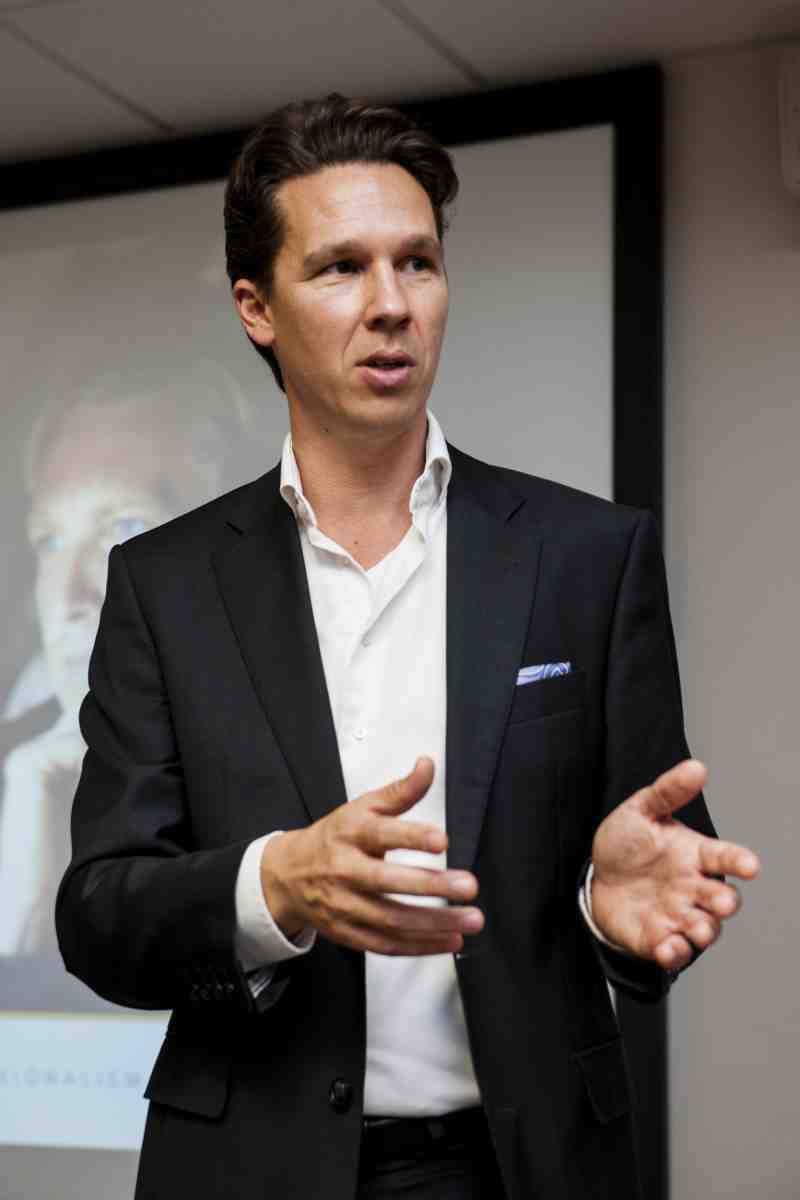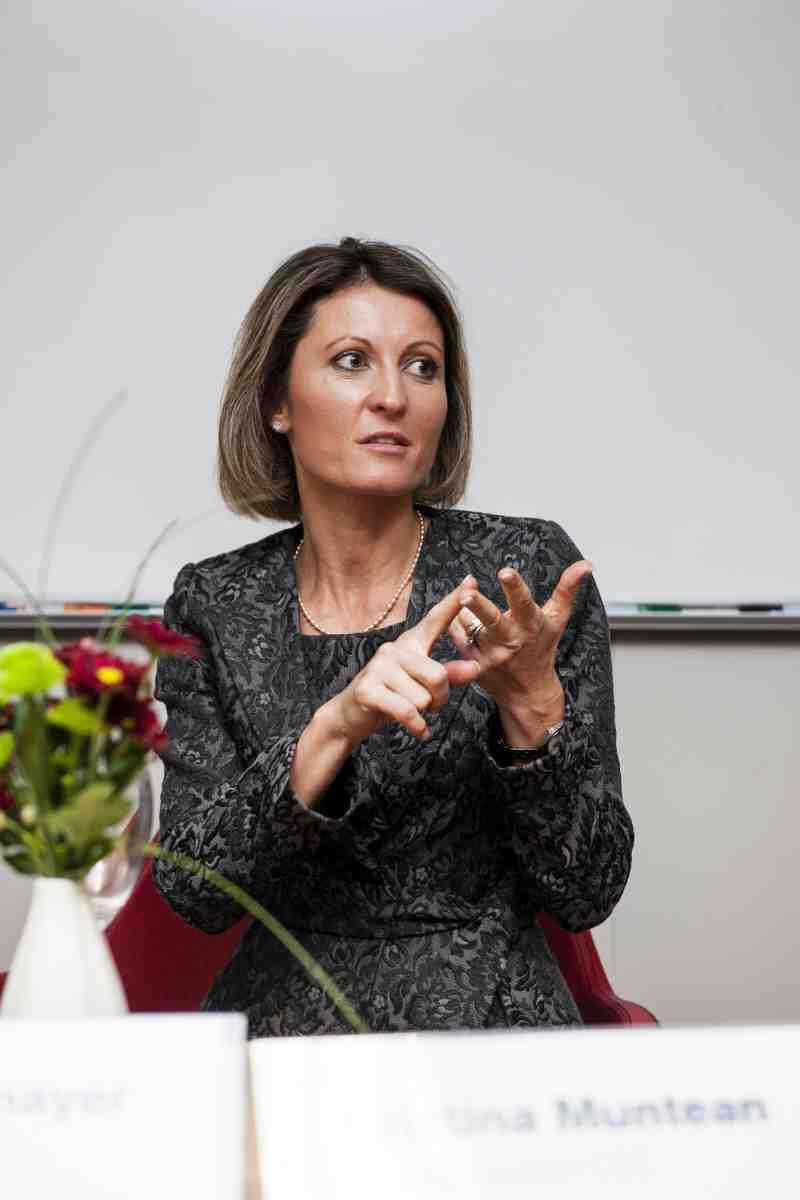Key to Salary Growth for Executives is a Combination of Competency Increase, Trust Building and Strategic Networking
October 2nd, 2014 - Prague, Czech Republic - Executive managers across Central and Eastern Europe can and should strive to increase their payroll in the future through a combination of competency building, developing trust and strategic networking.
This is one of the main conclusions reached during the panel discussion Salary negotiations and networking: A global perspective that took place in Prague on September 23, 2014. The panel was part of a series of executive events organized by the University of Pittsburgh’s Joseph M. Katz Graduate School of Business Executive MBA (EMBA) Worldwide program in Prague. Ms. Grabmayer joined the firm in 2009 and two years later she was promoted to Country Manager for Czech Republic, where she continued to expand the Czech business and build the Czech team. Additionally, in 2013, Ms. Grabmayer took over the management of Slovakia and Austria where, together with the respective Country Managers, she has continued to strengthen Pedersen & Partners’ market position and organization. Before joining Pedersen & Partners, Ms. Grabmayer was the Business Development Manager Europe at ProTrans International, U.S. based logistics firm and Sales Director at Business Travel Unlimited, daughter company of Raiffeisenlandesbank based in Austria. She began her career as Director for the Berlitz
The Katz panel was driven by Conrad Pramböck, Head of Compensation Consulting with the global executive search agency Pedersen & Partners, and by Petra Grabmayer, Partner and Country Manager of Pedersen & Partners in the Czech Republic. The panel was moderated by Cristina Muntean, strategic communications advisor and founder of the PR agency Media Education CEE.
Ivana Goossen, director for Katz’s EMBA Worldwide program in Europe, said that one of the most common expectations of EMBA students is that their salary would increase immediately upon EMBA graduation. “Even though our research shows that our executive graduates do increase their salaries by 41 percents within three years after graduation and by up to 46 percents on a longer term average, only being the alumnus of an executive program isn’t enough to propel you higher on the compensation scheme. Fortunately at Katz we have the platform and the will in order to proactively help our alumni to achieve their career goals,” she said.
Panel Topics
Want more money? Relocate, work harder, increase your competencies or change the company altogether
 “Very often people in executive positions address me to consult them on their salary levels. There are several options that I suggest for compensation growth,” said Conrad Pramböck of Pedersen & Partners. “First of all, you can relocate – only a few hundred kilometers away in Munich and your salary is already by 60 to 70% higher than in Prague. You move to London - your salary might increase by up to 80%. Yet, not everyone is willing to relocate. What is the left is a strategic approach towards your own career.”
“Very often people in executive positions address me to consult them on their salary levels. There are several options that I suggest for compensation growth,” said Conrad Pramböck of Pedersen & Partners. “First of all, you can relocate – only a few hundred kilometers away in Munich and your salary is already by 60 to 70% higher than in Prague. You move to London - your salary might increase by up to 80%. Yet, not everyone is willing to relocate. What is the left is a strategic approach towards your own career.”
Pramböck said: “You have three ways to increase your salary unless you’re willing to relocate. First is to increase your performance – you work harder, you deliver better results, you deserve more money. The second option is to increase your responsibility – for example from being a local branch manager to becoming a plant or a country manager. And third, which is also the most interesting, is to find a better paying job.”
Pramböck argued that numerous companies have salary brackets that do not allow HR managers to increase the salary levels of their executives beyond certain benchmarks. This is one of the reasons why, at a certain point in one’s career, a change of company is the only option for remuneration increase. He noted that numerous managers, when asked how they got a better paid job, point at coincidences. “I was at the right place at the right time speaking to the right people about the right thing. However, no one says it was luck. And my experience shows that you can’t influence luck, but you can definitely influence coincidences. You need to build an environment where you invite coincidence to happen,” Pramböck said.
Success is a combination of competency building, trust development and strategic networking
One of the means to increase competencies is through education. “You need to strive to become the best in class at what you do,” Pramböck said. He also recommended spending the first eight to ten years of one’s career into becoming a truly worthy specialist.
The second step is to let people know about your competencies. “You need to develop a network of people who are familiar with your profile and trust your expertise. You can do that by sharing your profile on social media, conduct presentations or share your knowledge through articles or blog posts,” he said.
“One of the biggest mistakes people do in their careers is to try to do it by themselves. It can never work – you can only succeed when you get more people involved who support you and are there for you,” Pramböck said, noting that “it was easy to put the first step on the Moon when there were 500,000 people working at NASA to support Neil Armstrong’s endeavor. The key to gain support is to support others first,” he emphasized.
Czech-owned companies provide more decision-making competencies
 Petra Grabmayer, the Partner and Country Manager of Pedersen & Partners in the Czech Republic noticed that managers’ salary scheme increase also varies according to the type of company for which they work. “It is one thing to work for a multinational corporation that tends to have firmer career growth and reward schemes, it’s another thing to work for a Czech-owned company where you have natural access to more responsibilities, and a totally different thing to work for a private equity company, whose aim is fast growth and ultimate exit,” she said.
Petra Grabmayer, the Partner and Country Manager of Pedersen & Partners in the Czech Republic noticed that managers’ salary scheme increase also varies according to the type of company for which they work. “It is one thing to work for a multinational corporation that tends to have firmer career growth and reward schemes, it’s another thing to work for a Czech-owned company where you have natural access to more responsibilities, and a totally different thing to work for a private equity company, whose aim is fast growth and ultimate exit,” she said.
“Many people ask me what is best for them. I would rather say: all three, but in the right order. At the beginning, an international company would give you a big name, maybe smaller bonuses but a lot of benefits, team buildings and opportunities to grow your competencies and network. In the next phase, a Czech family-owned company would usually offer you a much broader scope of responsibilities than international companies. You gain a much better overview of the cash flow, the product development, market challenges and so on. To a certain extent it’s like running your own company. In this respect it’s very important to gain the trust of the owners by showing them that you are really ready to take risks in the same way they were at the beginning of the business. Czech business owners aren’t that impressed when people come with clear expectations of their roles and reward just because that’s what they had in their previous jobs,” Grabmayer said.
“Last but not least, private equity is a very interesting experience for a certain type of manager usually after having worked in an international or local company. This comes at the stage when you are already a universal manager who has built his competencies and understands more aspects of the business such as finance, IT or company expansion,” she added.
From a certain level up salary isn’t the main motivation anymore
Grabmayer noted that at a certain stage in one’s career salary is already not the main motivation factor for changing the job. “I have personally placed several top executives this year who accepted the same or even slightly lower salaries simply because they were attracted by the new job,” she said, adding that several things changed with the economic crisis. “Now people do much more research about the company, its reputation, cash flow, strategic development plans or the specifics of a given role. People search for a new challenge, some interesting start and this is very often more motivational than just the salary package because they have already paid their mortgages, children are in schools and they can now focus on themselves.”
Grabmayer noted that education still remains one of the most important aspects of someone’s career growth. The personal brand comes second. “One should not underestimate its importance, particularly in the Czech Republic where we don’t like to be seen so much. Sometimes it’s surprising for me to realize that people find it hard to express in two sentences what they are doing. You need to be active, to write a blog or an article and send it to the newspapers because it’s great when you’re great, but it’s not so great when no one knows that you exist,” she concluded.
Pedersen & Partners is a leading international Executive Search firm. We operate 52 wholly owned offices in 50 countries across Europe, the Middle East, Africa, Asia & the Americas. Our values Trust, Relationship and Professionalism apply to our interaction with clients as well as executives. More information about Pedersen & Partners is available at www.pedersenandpartners.com
If you would like to conduct an interview with a representative of Pedersen & Partners, or have other media-related requests, please contact: Mark Anderson, Marketing & Communications Manager at: mark.anderson@pedersenandpartners.com
